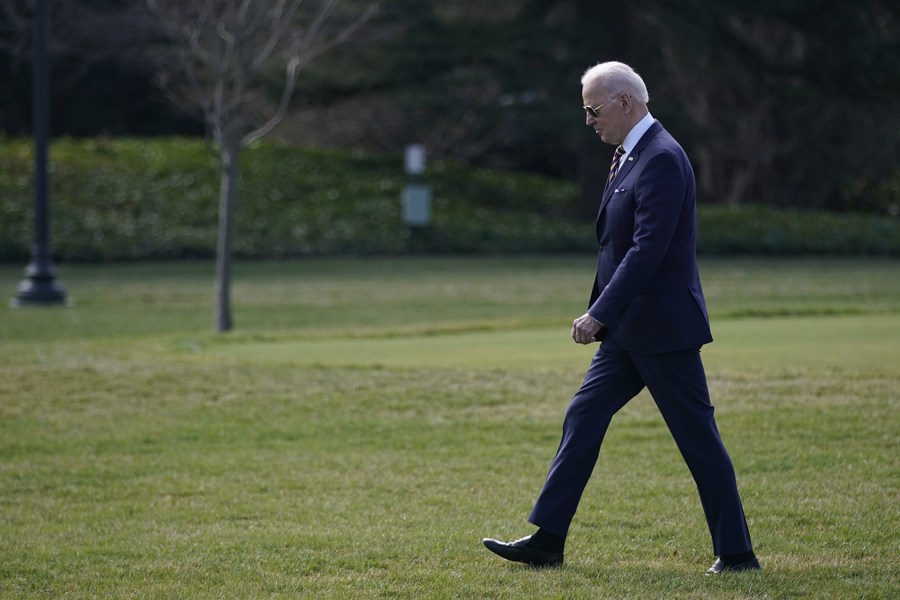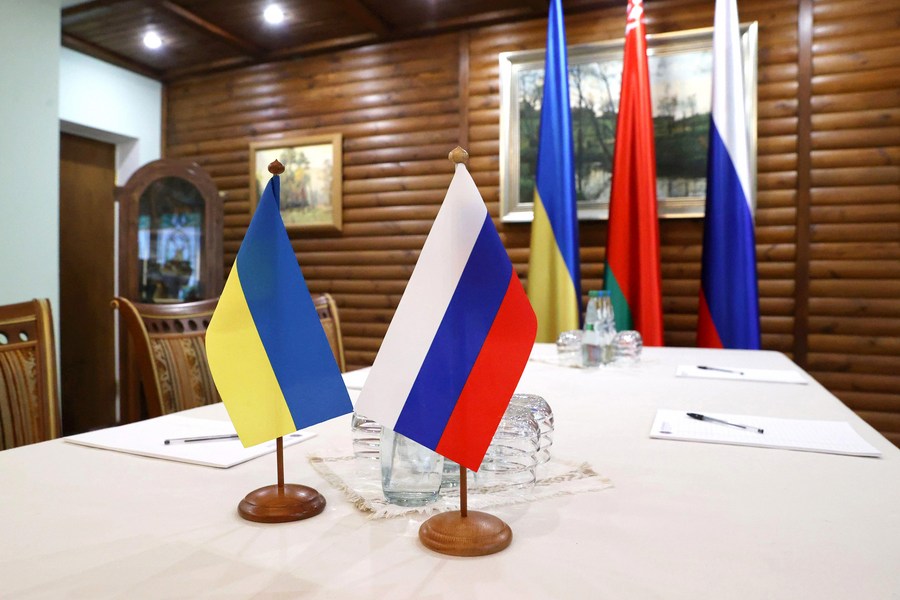West escalates sanctions on Russia over Ukraine crisis, countries intensify mediation efforts

U.S. President Joe Biden leaves the White House in Washington, D.C. March 8, 2022. (Photo by Ting Shen/Xinhua)
KIEV, March 9 (Xinhua) -- U.S. President Joe Biden announced on Tuesday the imposition of an energy embargo on Russia, a latest move against Russia over the Ukraine crisis, even though analysts have warned of potential huge consequences and spillovers.
Meanwhile, a new round of talks between Russia and Ukraine could draw near, with countries in Eurasia stepping up their efforts to mediate a political settlement.
WESTERN SANCTIONS
Since the start of the Russian special military operation, Western countries have imposed batches of sanctions on Russia.
On Tuesday, Biden declared the decision to ban U.S. imports of oil, liquified natural gas and coal from Russia over its ongoing military operations in Ukraine, noting that the new embargo "means Russian oil will no longer be acceptable to U.S. ports," while admitting it will backfire on Americans at home by causing continued price hike at gas stations.
The European Union, which relies on Russia for some 40 percent of its natural gas supplies, announced earlier Tuesday a set of comparatively limited measures, reducing imports of Russia natural gas by two-thirds this year and aiming to be free from dependence before 2030.
On March 3, Japan decided to freeze assets held by four Russian banks, following the decision by EU members one day earlier to exclude seven Russian banks from the SWIFT messaging system, the main system underpinning global financial transactions.
During a recent meeting with women flight crews of Russian airlines, Russian President Vladimir Putin said that the wave of Western sanctions is akin to a "declaration of war."
In retaliation, Russia on Monday said it had approved a list of countries and regions that took "unfriendly actions" against Russia, its companies and citizens and would take reaction steps.
Actually, sanctions often do not work well and may cause devastating impacts in certain cases, while negotiations are the only way out of the Ukraine crisis, Panitan Wattanayagorn, chairman of Thai prime minister's Security Advisory Committee, said in a recent interview with Xinhua.
"In the new era, we are all connected in a global market. Sanctions imposed on one country will hurt many others, and eventually may also hurt the country that imposed the sanctions," Panitan warned.

Photo taken on March 7, 2022 shows a view of the third round of talks between Russian and Ukrainian delegations at the Belovezhskaya Pushcha. (Belta news agency via Xinhua)
TALKS MOOTED, MEDIATION INTENSIFIED
A possible fourth round of Russia-Ukraine talks could take place in "the very near future," a Russian negotiator said after the third round of peace talks in Belarus on Monday, which failed in achieving major breakthroughs, but addressed the issue of civilian evacuation.
"The next round, given that the rounds take place almost every other day, so the next, fourth round will take place in Belarus in the very, very near future. I can't name the exact date yet," said Leonid Slutsky, member of the Russian delegation and head of the International Affairs Committee of the lower house of the Russian parliament.
However, the exact date and location of the new talks is yet to be confirmed by Kiev.
On Tuesday morning, Russian armed forces declared a "silence regime" and the opening of humanitarian corridors when Ukraine started evacuating residents from the northeastern city of Sumy through the humanitarian corridor as agreed with Russia.
The foreign ministers of Russia and Ukraine will meet in Turkey's southern province of Antalya on Thursday, on the sidelines of the Antalya Diplomatic Forum, said Turkish Foreign Minister Mevlut Cavusoglu on Monday.
During a press conference, the diplomat noted that the meeting would be held in a tripartite format, as part of Turkey's "intense effort" to bring both sides together for "a turning point" of the ongoing crisis.
During a video summit with French President Emmanuel Macron and German Chancellor Olaf Scholz on Tuesday, Chinese President Xi Jinping emphasized that "we need to jointly support the peace talks between Russia and Ukraine, and encourage the two sides to keep the momentum of negotiations, overcome difficulties, keep the talks going and bring about peaceful outcomes."
In the summit, Macron and Scholz shared their assessment and positions on the current situation in Ukraine, saying that France and Germany support reaching a settlement through negotiation and giving peace a chance.
On Sunday, Israeli Prime Minister Naftali Bennett said that his country will continue to mediate between Moscow and Kiev, "even if the chance is not great -- as soon as there is even a small opening, and we have access to all sides and the capability."

Workers install protections for a historic building in Lviv, Ukraine, March 8, 2022. (Xinhua/Ren Ke)
LATEST DEVELOPMENT
On Tuesday, U.S. Undersecretary of State for Political Affairs Victoria Nuland testified before a Senate Foreign Relations Committee hearing on Ukraine, admitting "Ukraine has biological research facilities."
"We are working with the Ukrainians on how they can prevent any of those research materials from falling into the hands of Russian forces should they approach," she said.
On the same day, the Russian Foreign Ministry said that it had received documentation from employees at Ukrainian biological laboratories, which confirmed the urgent destruction of dangerous pathogens such as plague, anthrax, tularemia, cholera and other deadly diseases on Feb. 24, according to a statement made by Russian Foreign Ministry Spokesperson Maria Zakharova.
She added that these laboratories were funded by the U.S. Department of Defense and were part of its biological weapons program.
Additionally, some observers see the Russia-Ukraine conflict as a chance to reflect on the role Washington and its allies have played in the regional geopolitical landscape.
The North Atlantic Treaty Organization is using the Ukraine crisis to pursue longer-term militaristic projects. "After the end of the United States' 20-year occupation of Afghanistan, and after two decades of the 'war on terror,' this is precisely the time to critically evaluate the impacts of U.S. militarism and push for demilitarization," said an article published on the website of Yes! Magazine on Monday.
"Instead, Washington is doing the opposite, with Biden reportedly considering a record 770-billion dollar military budget for 2023," said the article authored by Khury Petersen-Smith, the Michael Ratner Middle East Fellow at the Institute for Policy Studies.
In the view of John J. Mearsheimer, a U.S. international relations scholar, the Western narrative about Russia in the Ukraine crisis "is a story that we invented to blame him (Putin)... The West, especially the United States, is principally responsible for this disaster," according to an article published in The New Yorker earlier this month.
Photos
Related Stories
- Chinese nationals' evacuation in Ukraine complete! All safe: embassy
- China sends first batch of humanitarian aid to Ukraine
- Ukraine says Chernobyl nuclear power plant disconnected from power grid
- Egyptian, Russian presidents hold phone talks over Ukraine situation
- Russia urges U.S. to explain purpose of biological labs in Ukraine
Copyright © 2022 People's Daily Online. All Rights Reserved.










